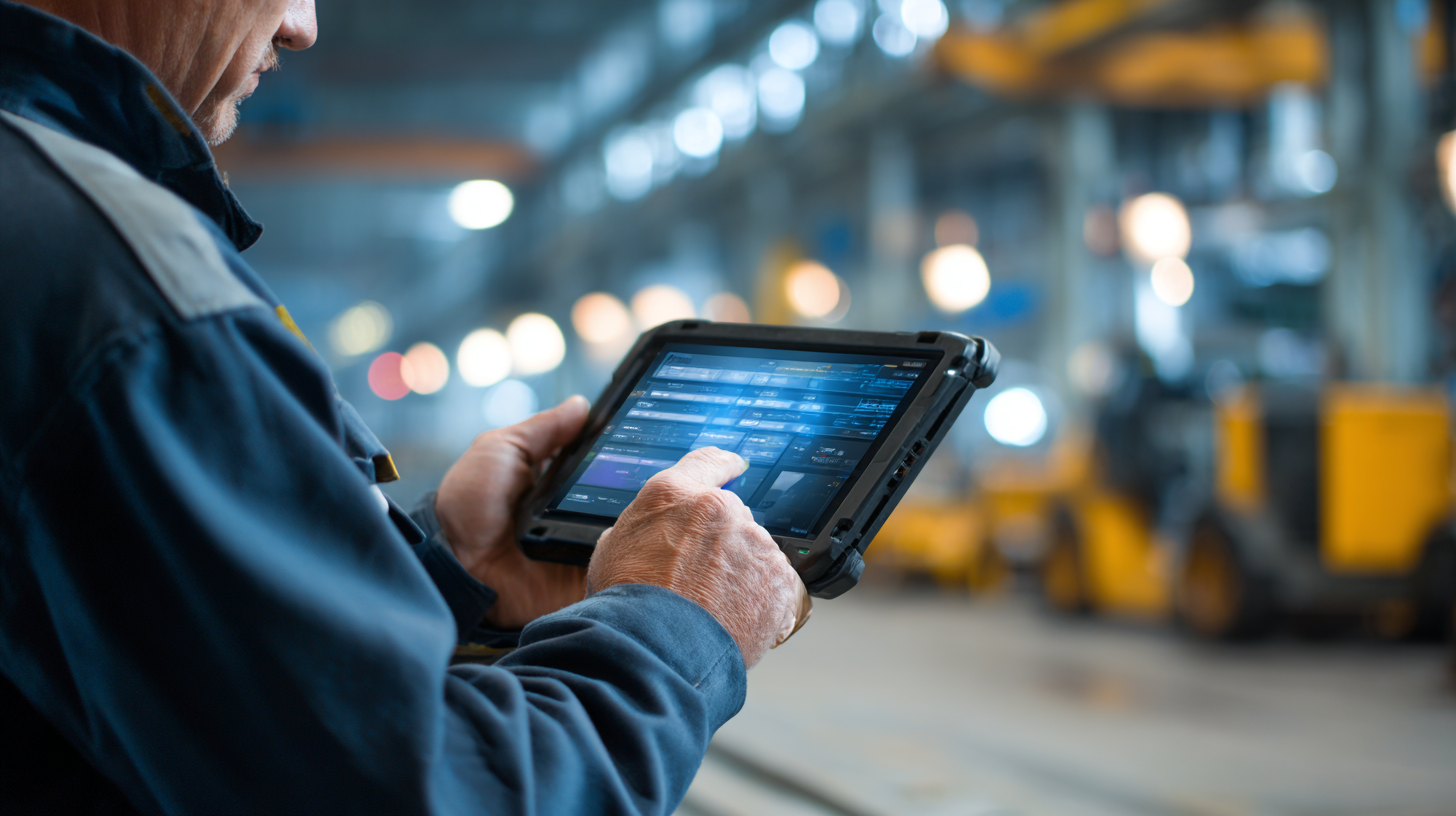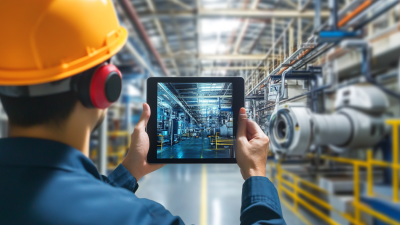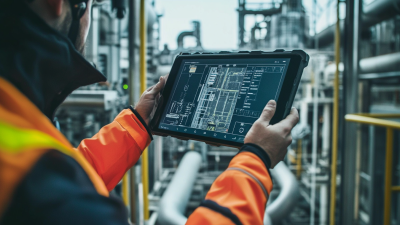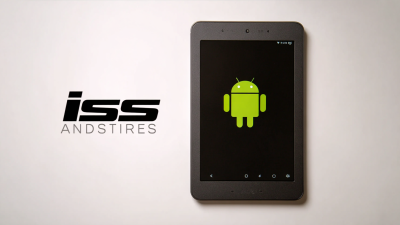Unlocking the Future: How Industrial Android Tablets Are Revolutionizing Manufacturing Efficiency
As the manufacturing industry continues to embrace digital transformation, the advent of
Industrial Android Tablets has emerged as a pivotal
innovation driving operational efficiency. According to a recent report by Grand View Research, the global market for industrial
tablets is expected to reach USD 2.5 billion by 2027, indicating a compound annual
growth rate (CAGR) of over 7% during the forecast period. These rugged, versatile devices are designed to
withstand the demanding environments of manufacturing floors while integrating seamlessly with existing technologies.
The capability of Industrial Android Tablets to streamline workflows, facilitate real-time data access, and improve
communication among teams is redefining best practices in the sector. With features like touch functionality and
compatibility with various applications, they empower workers to make informed decisions
on the spot, ultimately leading to enhanced productivity and reduced downtime.
The future of manufacturing lies in the hands of these innovative tools, unlocking new levels of efficiency and
adaptability in an increasingly competitive landscape.
Transforming Workflows: The Role of Industrial Android Tablets in Streamlining Production Processes
The integration of industrial Android tablets into manufacturing environments is streamlining production processes and transforming workflows like never before. According to a recent report by the International Data Corporation (IDC), the deployment of mobile devices in manufacturing can result in a 20% increase in operational efficiency. These tablets can be used for real-time data collection, inventory management, and communication, allowing workers to access critical information on the shop floor without returning to their desks.
Implementing industrial Android tablets allows workers to digitize workflows, significantly reducing paperwork and streamlining tasks. A study by Gartner highlights that companies adopting mobile technology in their manufacturing operations see a reduction in process times by up to 50%. Employees can quickly check inventory levels, monitor machine performance, and record production data, facilitating faster decision-making and minimizing downtime.
Tips: When choosing industrial Android tablets, ensure they are ruggedized to withstand harsh manufacturing environments. Additionally, invest in a robust mobile device management (MDM) system to secure and optimize your tablets for efficiency. Lastly, provide training for your employees to maximize the benefits of this technology, ensuring they can utilize the devices effectively to enhance their productivity.
Real-time Data Access: Enhancing Decision-Making on the Manufacturing Floor
In today’s fast-paced manufacturing environment, real-time data access is crucial for enhancing decision-making on the factory floor. Industrial Android tablets are becoming essential tools that enable workers to retrieve and analyze data instantly. With features that support connectivity to various machines and production systems, these tablets empower operators to monitor workflows and identify bottlenecks efficiently. By providing immediate visibility into production metrics, employees can make informed choices that improve workflow and elevate overall efficiency.
Moreover, the intuitive interfaces of Android tablets facilitate a seamless integration into existing manufacturing processes. Workers can easily navigate between applications to access critical information regarding inventory levels, machine performance, and operational efficiency. This immediate access to data not only accelerates response times but also enhances collaboration among team members, as everyone can stay informed and aligned with real-time insights. The ability to make swift, data-driven decisions transforms traditional manufacturing practices, aligning them with the demands of modern industry standards.
Unlocking the Future: How Industrial Android Tablets Are Revolutionizing Manufacturing Efficiency
| Feature |
Description |
Benefit |
| Real-time Data Access |
Instant access to production data and analytics on the shop floor. |
Enhances responsive decision-making and reduces delays in operations. |
| Mobile Workstation |
Portability allows workers to access information and manage tasks from anywhere in the facility. |
Increases productivity by reducing time spent moving to fixed stations. |
| Integration with IoT Devices |
Connects seamlessly with IoT sensors and machinery. |
Improves monitoring capabilities and predictive maintenance strategies. |
| User-friendly Interface |
Simplified navigation designed for ease of use in fast-paced environments. |
Reduces training time for employees and enhances operational efficiency. |
| Durable Design |
Built to withstand harsh industrial environments, including dust and moisture. |
Minimizes downtime and repair costs associated with device failures. |
Increased Mobility: How Tablets Enable On-the-Go Operations and Remote Monitoring
In today's fast-paced manufacturing landscape, the advent of industrial Android tablets has redefined operational processes, particularly by enhancing mobility. These devices are not merely tools for data entry; they allow real-time access to crucial information right on the factory floor or in remote locations. With employees equipped with tablets, decision-making becomes instantaneous, enabling them to address issues swiftly without having to return to fixed workstations. This mobility fosters an agile environment where teams can adapt quickly to changing demands, ultimately leading to improved productivity.
Tips for maximizing the benefits of industrial tablets include ensuring robust connectivity so that employees can maintain access to data even in remote areas. Additionally, it’s vital to select durable devices that can withstand the rigorous conditions of manufacturing environments, such as dust and temperature variations. Investing in training programs on leveraging tablet technologies can further enhance employee efficiency and confidence.
Another key advantage of these tablets is their capability for remote monitoring. Managers can oversee processes and track equipment performance from anywhere, reducing the need for constant on-site presence. To fully harness this feature, consider integrating cloud-based software that facilitates seamless data sharing and collaboration among team members, ensuring everyone is aligned and informed, regardless of their physical location.

Improving Collaboration: The Impact of Tablets on Team Communication and Coordination
In the fast-paced world of manufacturing, effective team communication and coordination are essential for maximizing operational efficiency. Industrial Android tablets have emerged as a transformative tool, fostering collaboration across various departments. According to a report by McKinsey & Company, companies that embrace digital collaboration tools can enhance productivity by up to 25%. Tablets facilitate real-time communication, allowing team members to share information instantly, thereby reducing delays caused by outdated systems or hierarchical bottlenecks.

Moreover, a study by the International Data Corporation (IDC) found that 70% of manufacturing professionals believe that having access to mobile devices significantly improves their ability to coordinate tasks and make critical decisions on the shop floor. The intuitive interface of Android tablets enables workers to access blueprints, operational data, and instructions with ease, which enhances their ability to communicate effectively. This streamlined access not only empowers employees but also fosters a culture of teamwork and agility, enabling organizations to respond quickly to production challenges and opportunities alike.
Cost-Efficiency Gains: A Comprehensive Look at ROI from Implementing Android Tablets in Industry
The advent of industrial Android tablets is reshaping the landscape of manufacturing efficiency, particularly when it comes to cost savings and return on investment (ROI). According to a report by Grand View Research, the global industrial tablet market is expected to reach $1.27 billion by 2026, growing at a CAGR of 15.1%. This surge highlights the growing reliance on mobile technology in production environments. Enterprises adopting Android tablets have reported significant reductions in downtime and operational costs, with some manufacturers experiencing up to a 30% increase in productivity.
Moreover, a study conducted by IDC found that companies implementing Android tablets reported an average ROI of 200% within 18 months. This remarkable figure can be attributed to enhanced workflows, real-time data access, and streamlined communication among teams. The integration of Android tablets allows for immediate troubleshooting and inventory management, which minimizes latency in production lines. As manufacturers continue to explore ways to optimize their processes, the financial benefits of deploying these devices becomes increasingly clear, positioning them as essential tools for modern industrial operations.
Unlocking the Future: Cost-Efficiency Gains from Implementing Android Tablets in Manufacturing
This chart illustrates the Return on Investment (ROI) and cost-efficiency gains achieved by manufacturers after implementing Android tablets. The data reflects improvements in productivity, operational costs, and workforce efficiency over a 12-month period.

Home
Products
Solutions
MDM Software
OEM/ODM
About Us
About 3Rtablet
Quality Control
Contact Us
News
New Product Launch: 3R Rugged Tablet PC: AT-10AL—Powerful Customization with Yocto System
3Rtablet: Enhancing Your Off-Road Adventures,Your Ultimate Off-Road Companion
3Rtablet: Powering Productivity in Construction and Agriculture
Choosing Your Ideal Linux Rugged Tablet: Why Opt for Yocto?
Choosing Your Ideal Linux Rugged Tablet: Why Opt for Debian?
Yocto VS Debian - Choosing Between Yocto and Debian
GMS Certified Android Device: Ensuring Compatibility, Security and Rich Functions
New Arrivals: Rugged Android 12.0 or Linux Yocto OS Vehicle Telematics Box for Vehicle Applications in Various Sectors
Rugged Tablet For Taxi Dispatch
Rugged Driver Tablets Revolutionize Safety and Efficiency in Mining Operations
Rugged In-Vehicle Tablets Power the Growth of IoT Revolution in Modern Industries
VT-7A PRO: New Android 13 Rugged Vehicle Tablet with GMS Certification
Taxi Dispatch Rugged Vehicle Tablet: Taximeter Ruggedized Car Tablet PC with CANBUS MDT Terminal Is Bound to Make an Impact in Your Business
Sick and Tired of Doing Fleet Management the Old Way? Read This! Discover Smarter Solutions with MDT Terminals, Rugged Vehicle Tablets, MDM Platforms, and More
Global Memory Supply Faces Severe Disruptions Amid AI-Driven Demand Surge
Public Transportation Transformation Accelerates: Rugged Tablets Become the Brain of the Smart Bus
Smart Anti-Collision System Unveiled: Rugged Tablet Integrates Advanced Al Pedestrian Detection Reversing Camera Technology
Driving Forward Together | Merry Christmas from 3Rtablet
Experience Durability: How 3Rtablet Redefines the Standards of a China Leading 7 Inch Tablet Rugged Factory
A Comprehensive Buyer’s Guide to Selecting a China Leading IP67 Rugged Devices Supplier
FAQs
 AT-10A
AT-10A AT-10AL
AT-10AL VT-7 GA/GE
VT-7 GA/GE VT-7 Pro
VT-7 Pro VT-7 PRO (AHD)
VT-7 PRO (AHD) VT-7A
VT-7A VT-7AL
VT-7AL VT-10
VT-10 VT-10 IMX
VT-10 IMX VT-10 Pro
VT-10 Pro VT-10 Pro AHD
VT-10 Pro AHD VT-7
VT-7 VT-7A PRO
VT-7A PRO VT-10A Pro
VT-10A Pro ST-7 Rugged Table
ST-7 Rugged Table VT-5A
VT-5A VT-5
VT-5 VT-BOX
VT-BOX VT-BOX-II
VT-BOX-II AI-MDVR040
AI-MDVR040 AT-B2
AT-B2 AT-R2
AT-R2







